
Global Early-Warning Systems Lag as Climate Disasters Surge
The United Nations’ World Meteorological Organization (WMO) has issued a stark warning: nearly half of the world’s countries still lack early-warning systems for extreme weather events, leaving millions—especially in developing nations—vulnerable to catastrophic loss of life and property.
Releasing its latest global report in Geneva on Monday, the WMO urged nations to bridge gaps in monitoring and forecasting systems, stressing that timely alerts are critical as climate change intensifies storms, floods, droughts, and heatwaves.
“Many millions of people lack protection against dangerous weather, which is inflicting an increasing toll on economic assets and vital infrastructure,” the WMO said, noting that disaster-related deaths are six times higher in nations without warning systems.
Climate-Related Hazards: Over 2 Million Deaths in 50 Years
According to the WMO report, weather, water, and climate-related hazards have claimed more than two million lives over the past five decades. Alarmingly, 90 percent of these fatalities occurred in developing countries, where limited infrastructure and underfunded meteorological agencies hinder prevention and response efforts.
The agency warned that “impacts are spiralling as weather becomes more extreme,” pointing to an accelerating pattern of devastation worldwide.
Uneven Progress in Early-Warning Coverage
While there has been significant progress—108 countries now have some form of multi-hazard early warning systems, up from just 52 a decade ago—large gaps remain.
A detailed assessment of 62 countries found that:
- 50% have only basic capacity for disaster forecasting and alerts.
- 16% have less than basic capacity, leaving populations largely unprotected.
- Conflict-affected and fragile states are the worst off, with little or no reliable climate monitoring.
“The situation is worst in fragile, conflict and violence-affected contexts,” the WMO reported, emphasizing the urgent need for global investment and data-sharing.
Africa Showing Promising Advances
Despite challenges, Africa is making measurable progress, with more nations developing official weather websites and standardizing alerts. WMO Secretary-General Celeste Saulo praised these steps while reinforcing the agency’s central mission:
“Early warning means early action. Our goal is to not only warn the world; it is to empower it.”
The WMO’s “Early Warnings for All” initiative aims to ensure every person on Earth is protected by a warning system by 2027—a goal that requires unprecedented international coordination and funding.
2025: A Year of Record-Breaking Weather Disasters
This year alone, extreme weather has battered nearly every continent.
- Pakistan, Nigeria, and South Korea have faced catastrophic flooding.
- Southern Europe and the United States have endured record wildfires.
- Deadly heatwaves and droughts have disrupted agriculture, water systems, and energy grids.
Images of devastation—like residents wading through floodwaters in Mokwa, Nigeria, or wildfires engulfing towns in western Greece—have underscored the human and economic cost of delayed climate action.
“Permafrost melt will inevitably lead to more glacier collapses and rockfalls,” said Elisabeth Baume-Schneider, Switzerland’s Minister of Home Affairs, citing a May 2025 incident where early monitoring helped avert tragedy by enabling the evacuation of the Swiss village of Blatten before a glacier collapse.
The Path Forward: Global Coordination and Technology
The WMO called for:
- Investment in real-time weather monitoring and satellite data networks.
- Training and technical assistance for developing nations.
- Integration of AI and predictive modeling to improve accuracy.
- Stronger climate finance commitments from wealthier nations to close capability gaps.
Without comprehensive, global early-warning coverage, the agency warned, the next decade could bring unprecedented human suffering and economic losses driven by climate extremes.
Key Takeaway
The WMO’s message is clear: every minute counts when it comes to saving lives from climate disasters. Expanding early-warning systems worldwide isn’t just a technological challenge—it’s a moral imperative.


Leave a Reply